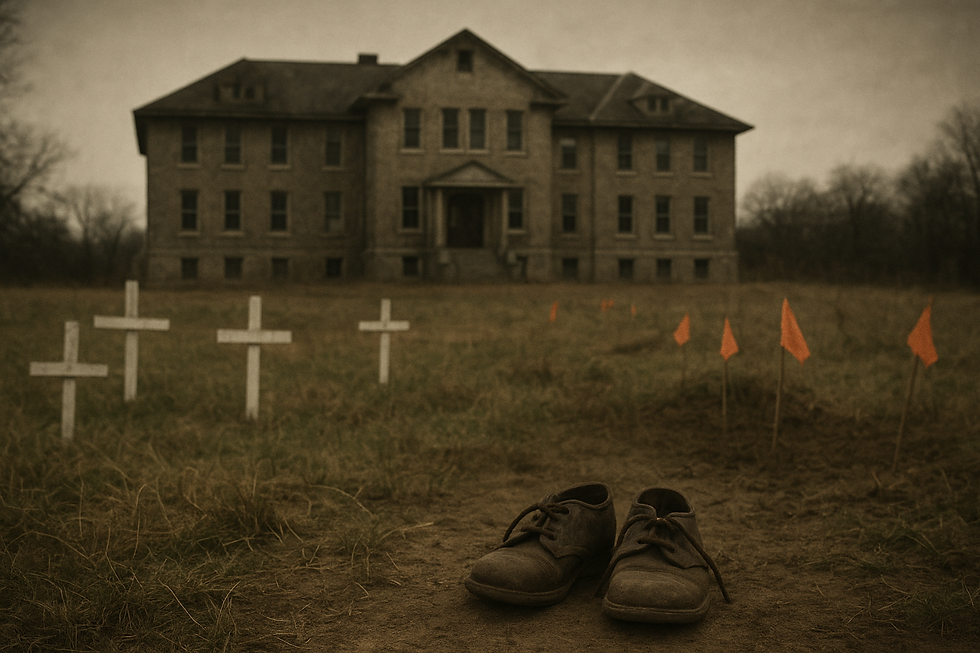Genocide Beyond the Frame of Reconciliation
- Alison Lam

- Sep 30, 2025
- 3 min read
This statement was not released on the National Day of Truth and Reconciliation. That was intentional. Genocide does not belong to a single day, nor does accountability.
Ordinarily on the National Day of Truth and Reconciliation, I recognize it in some way; some years, I have visited former residential schools, while others, I have attended lectures given by Elders. This year, I did none of that, because a conversation demanded of me a day of sober reflection on language, harm and accountability.
As the result of a land acknowledgement that I delivered, I was challenged for calling what Canada had subjected Indigenous communities to “genocide”. I was told that it was nothing more than “assimilation” or even “cultural genocide”, but to call it actual genocide was going too far. I argued that the term “cultural genocide,” often used to describe residential schools, is purposely misleading and nothing more than a colonial shirking of responsibility. It attempts to hide the full scope of harm and misdirects us from legal and ethical responsibility. What occurred, and continues to occur, is genocide.
Under the United Nations Convention on the Prevention and Punishment of the Crime of Genocide (1948), genocide includes:
Killing members of the group
Causing serious bodily or mental harm to members of the group
Deliberately inflicting conditions of life calculated to bring about the destruction of the group
Imposing measures intended to prevent births within the group
Forcibly transferring children of the group to another group
Canada meets all of these criteria.

How Canada Executed Genocide
Residential schools forcibly removed children, banned Indigenous languages, and inflicted physical and sexual abuse. In June of 2021, 751 unmarked graves were discovered at the Marieval Indian Residential School in Cowessess First Nation. That’s 751 children who never made it home. That’s 751 families that never learned what happened to their precious children. That’s 751 explanations that the Canadian government still owes to the First Nations community. And that’s just one site; the late Senator Murray Sinclair believed the number could be as high as 6,000.
St. Anne’s Residential School used a homemade electric chair to torture children. Electroshock is gruesome on its own, but to use them deliberately on children, in front of other children, is despicable.
Experiments were conducted to deliberately malnourish Indigenous children to test army rations and vitamin supplements. These children were treated as disposable test subjects and fed experimental substances to determine whether they were fit for human consumption.
Forced and coerced sterilizations were performed on Indigenous women and girls, including minors. Indigenous women and girls were forced or coerced without free prior informed consent to undergo hysterectomies and tubal ligations. These were acts of gender-based violence and colonial erasure carried out with the express intent to destroy Indigenous nations.
These are not historical footnotes, not when we fail to recognize and continue to deny that this is genocide.
Refusing Euphemism and Taking Responsibility
To call this “cultural genocide” is to lessen the significance of the harm that was caused. It was not cultural genocide. The harm was physical, mental, emotional, institutional, and intergenerational. Survivors are not proof that genocide didn’t occur, they are proof that it did.
While the National Day of Truth and Reconciliation is important to commemorate, the minimization of genocide through specifically-chosen rhetoric and calendar-bound commemoration does not mean that we can ignore the importance of Reconciliation on every other day. And, as one of the essential acts of Truth and Reconciliation, the dilution of harm through euphemistic language, calling it “cultural genocide” or “assimilation” as opposed to actual genocide, must be stopped.
I write this seeking to affirm that the genocide committed by Canada is not a metaphor; it is a legal, ethical, and lived reality. Truth does not expire, and accountability does not wait for sanctioned days.



